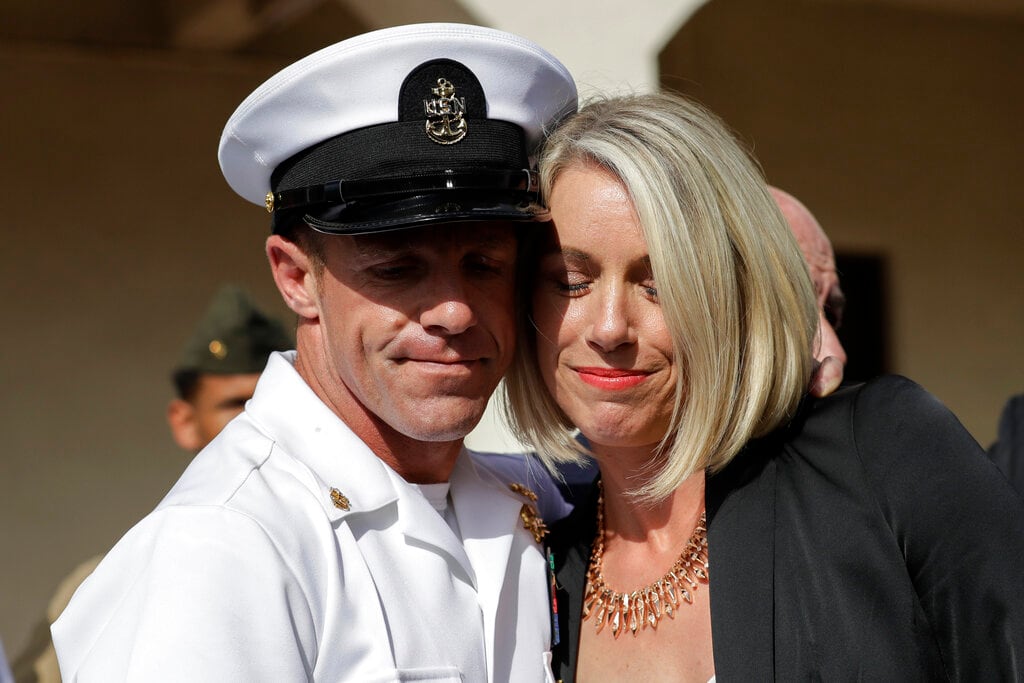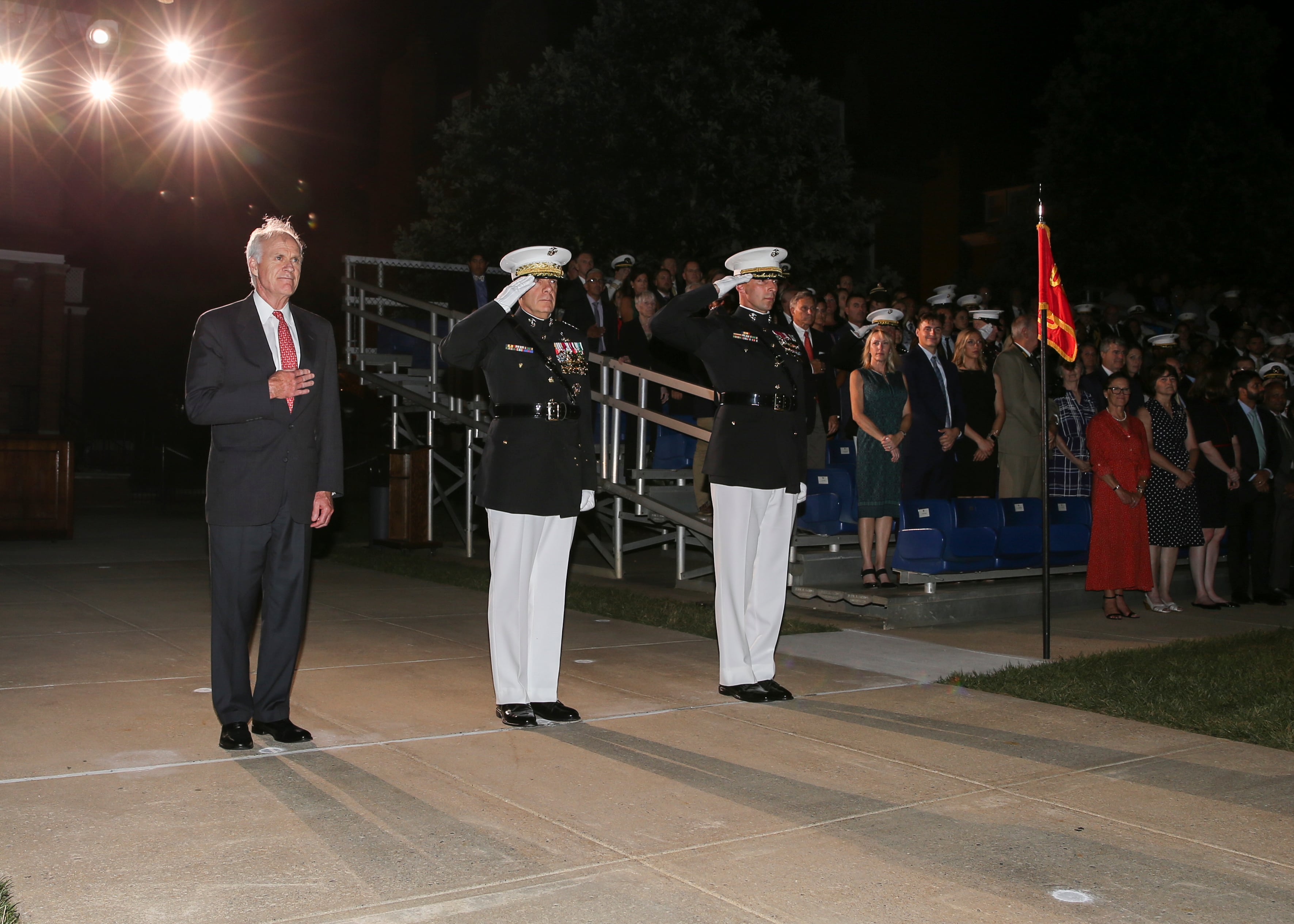Secretary of the Navy Richard V. Spencer on Wednesday expanded an ongoing Navy probe into its Judge Advocate General Corps to include Marine JAGs.
A Marine Corps veteran, Spencer ordered both the chief of naval operations and the Marine commandant to put the reports on his desk within 90 days and indicated he expected the “comprehensive review will have the support of the entire Navy and Marine Corps leadership teams.”
“There is value in applying this review and its subsequent recommendations across the Department of the Navy,” said Navy spokesman Cmdr. Jereal E. Dorsey in an email to Navy Times. "The review’s purpose is to confirm the uniformed legal community is structurally and organizationally sound and best supporting the good order and discipline our integrated Naval force.”
Spencer’s memorandum ordered the Navy and Marines to study the laws, regulations, policies, resourcing “and any corrective actions necessary” to revamp legal community training and professional development; organization and command relationships and oversight; staffing levels; and career progression of the sea services’ attorneys.
Spencer indicated that he’s already appointed “a group of experts to an Executive Review Panel” to study the consolidated report when it arrives. He urged both the Navy and Marine Corps to seek insight from other services and federal agencies, industry and “highly qualified experts outside the government to the extent necessary to ensure the widest possible perspective.”
RELATED

SECNAV’s order came 20 days after then-CNO Adm. John Richardson directed Vice Chief of Naval Operations Bob Burke to investigate “the leadership and performance” of the Navy’s JAGs.
Richardson had been mulling the move since the July 2 verdict in the war crimes court-martial trial of Special Warfare Operator Chief Edward “Eddie” Gallagher, a SEAL who had been accused of murdering an Islamic State prisoner of war in Iraq in 2017, obstructing justice and other crimes.
But a panel of his peers mostly composed of combat-tested Marines tossed all the specifications except for a minor charge of posing with the dead detainee’s body, something Gallagher never denied doing.
The prosecution team squaring off against Gallagher had been sanctioned by Navy judge Capt. Aaron Rugh for violating the constitutional rights of the defendant. Part of Rugh’s punishment included booting Cmdr. Christopher Czaplak, the lead prosecutor.
At the heart of the scandal was a warrantless surveillance program featuring Czaplak that was cooked up with Naval Criminal Investigative Service agents to track emails sent by defense attorneys and Navy Times, allegedly to uncover leaks after questions emerged that military officials were hiding evidence that could clear Gallagher.
Prosecutors and NCIS agents also were accused of manipulating witness statements; using immunity grants and a bogus “target letter” in a crude attempt to keep pro-Gallagher witnesses from testifying; illegally leaking documents to the media to taint the military jury pool; and then trying to cover it all up when they got caught.
Navy officials have since removed Czaplak as a prosecutor and reassigned him to the information technology wing of Regional Legal Service Office Southwest but Richardson was so concerned about the post-sentencing phase of Gallagher’s court-martial that he removed the case from San Diego authorities and brought it into his office.
Richardson on Thursday retired and was relieved by Adm. Michael M. Gilday, who now will determine whether Gallagher gets busted down to the lowest pay grade, remains a chief or is demoted to petty officer first class.

Marine spokesman Capt. Joseph A. Butterfield told Navy Times that his service “has conducted reviews of the legal community in the past” and there’s an ongoing assessment being conducted by the Center for Naval Analysis.
Butterfield said that no additional details into the new Marine review are available now.
Retired Marine armor officer and military attorney Lt. Col. Robert “Butch” Bracknell said Spencer’s order made sense because the legal communities in both services “are so closely intertwined.”
The Navy JAG comprehensive review "came on the heels of a handful of highly publicized cases that involved perceived errors, gaffes, and unethical conduct by Navy lawyers,” he said. “Like the surface force comprehensive review — which was spurred by the McCain and Fitzgerald collisions — I suspect these seminal events were merely the culminating points for concerns that have been building for a while.”
Bracknell said that he doesn’t sense the same concerns about the performance of Marine JAGs but he pointed to cases over the past six years dogged by allegations of misconduct and incompetence, including the prosecutions of Cpl. Joseph B. Salyer and Cpl. Wilfredo Santiago.
“No matter what, the Marine Corps should look at this as an opportunity to improve its training, manpower policies, organization, and culture, rather than adopting a defensive stance,” Bracknell said.
“Corporations pay consultants to help them get better all the time. There’s a whole industry organized around continuous process improvement and performance improvement consultancy. The Navy JAG Corps and the Marine legal community get an external, unbiased, honest look at how they are doing business for free.”
Prine came to Navy Times after stints at the San Diego Union-Tribune and Pittsburgh Tribune-Review. He served in the Marine Corps and the Pennsylvania Army National Guard. His awards include the Joseph Galloway Award for Distinguished Reporting on the military, a first prize from Investigative Reporters & Editors and the Combat Infantryman Badge.




